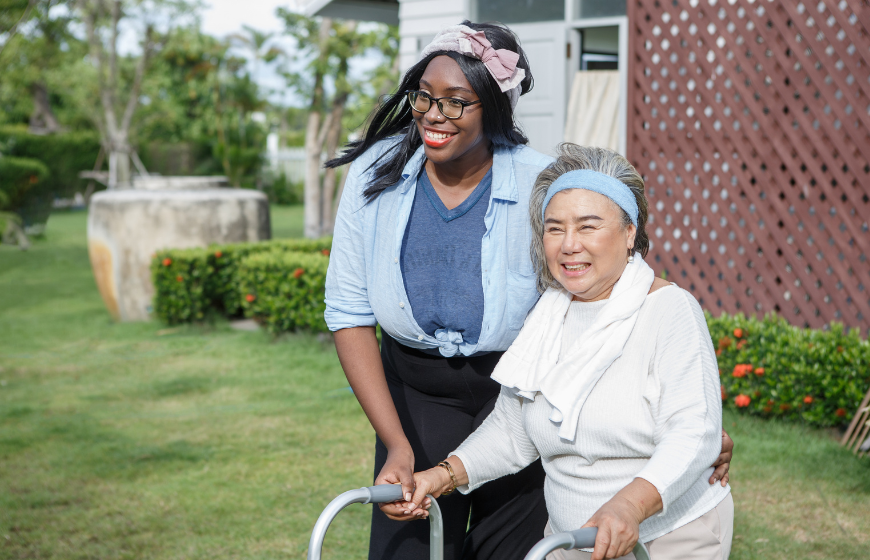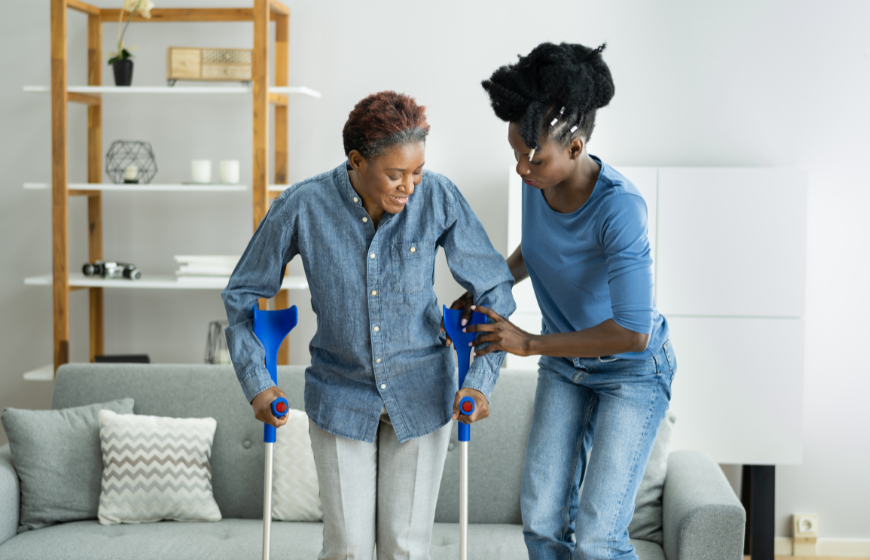As your loved ones get older, you might begin worrying about how they’ll get by from day to day. When it becomes evident that your parent, partner, or other aging family member needs support, you might feel inclined to take care of everything yourself. However, this isn’t the most practical solution in many cases, and it may not even be possible. The benefits of home care or a nursing home for not only your loved one, but also you as the caregiver, are worth every penny.
Caregiving is a time-consuming, physically demanding, and sometimes emotionally exhausting job. Though help from family members can be a vital piece of the puzzle, it’s often best to leave the bulk of care to professional caregivers.
There are various types of care for seniors, which fall into two general categories: home care and nursing homes. So, what’s the difference between nursing home care and at-home care, and how do you know which is better for the senior in your life? Keep reading to find out.
Home Care vs. Nursing Home: What’s the Difference?
When an elderly loved one is no longer able to look after themselves or complete their day-to-day activities, family members are often faced with the task of arranging for care. Though the conversation isn’t always easy, presenting them with care options can help.
Nursing Homes
Elderly care is often associated with nursing homes. As a result, many people opt for this type of care without researching the benefits, drawbacks, and alternative solutions.
Sometimes called a skilled nursing facility, convalescent home, or long term care facility, a nursing home is a residential care environment for seniors. Aging adults who live in residential care homes have access to around-the-clock skilled nursing care.
Pros of nursing homes:
- 24-hour care in a safe, secure assisted living facility
- Staffed by skilled healthcare professionals
- Access to medical and non-medical services
- Opportunities for socialization
Cons of nursing homes:
- Lack of independence
- Lack of privacy
- Living away from home
- Unfamiliarity can be uncomfortable
- Can be expensive
Another thing to note about nursing homes is that seniors may be at a higher risk of contracting viral illnesses. While this isn’t a new concern, it’s particularly worrisome in the coronavirus era. According to the University of Minnesota CIDRAP (Center for Infectious Disease Research and Policy), 21% of nursing home patients who tested positive for COVID-19 between March and September 2020 passed away within 30 days.
Home Care
With home care, seniors can get the care they need while living in the comfort of their domains. They can generally receive all the same services a nursing home provides with the added benefit of residing in a familiar environment. As a caregiver to your loved one, you may also want to look into in home respite care.
Look out for signs a senior needs help at home. Care needs vary from person to person, and they often change over time. This can make it difficult to identify the needs of your loved one. Flexibility is a primary advantage of home care, filling in the gaps for caregiving family members and allowing for adjustments along the way. If your loved one is dealing with kidney disease, home kidney care is a great option to help them deal with the illness without moving them out of their home.
You can arrange for services every day, a couple of days a week, or for a few hours a day. Similar to skilled nursing facilities, aging adults can also get 24-hour care at home, whether the need is long-term or temporary. The benefits of home care are extensive.
Pros of at-home care:
- Comfortable, familiar environment
- Personalized services
- Ability to maintain independence and dignity
- More freedom and privacy
- Opportunities for family involvement
- A safe solution for living at home
- Companionship and human interaction
- More flexibility
- Lower risk of viral infections
- Often more affordable than nursing homes
Cons of at-home care:
- Fewer social opportunities
- May not be as secure as a nursing home
According to the AARP (American Association of Retired Persons), nearly 80% of aging adults want to remain in their homes for as long as possible—even if it means they’ll need help with their daily activities. In these cases, the saying “There’s no place like home” has never been more true.
Seniors who may be wary of outside support and resistant to nursing homes are often willing to compromise with home care. It can also be beneficial for those with dementia or Alzheimer’s disease, as it’s typically less disruptive and confusing than transitioning to a convalescent home. Not only that, but at-home care can ultimately help individuals improve their quality of life.
At-Home Care Services for Aging Adults
Home care professionals can offer a range of essential services, such as private duty nursing, in-home hospital care, post-surgical care, care for chronic illnesses, and palliative end-of-life care. Additionally, home health aides in New York can assist with various everyday tasks and self-care needs.
Whether your loved one needs ADL (activities of daily living) care to complete their day-to-day self-care tasks, nursing care, care for a chronic illness, or all of the above, a skilled caregiver can meet their needs right at home. In any case, they’ll get one-on-one attention and support from a trained medical professional while maintaining their dignity and independence.
Home Care vs. Nursing Home: Which Is Better?
For many, there’s simply no substitute for living at home—looking out your window, sitting in your favorite chair, sleeping in your own bed, and being surrounded by familiar comforts. Additionally, relocating can be stressful for aging adults and their families.
Having said that, there are numerous factors to consider, and it’s ultimately a personal choice. For instance, the impact of social isolation on seniors can be detrimental if they aren’t getting that with at-home care, as opposed to a nursing home where they would be more stimulated. In the end, the care solution you select should be in the best interest of the individual’s mental and physical well-being.
Trusted At-Home Care in the New York City Metro Area
If your loved one is struggling to care for themselves but wants to maintain their independence, we encourage you to consider arranging for at-home care with Alliance. We offer a variety of NYC home health care services, including home health aide care, at-home nursing care, and end-of-life care.
At-home health aide services can involve:
- Bathing, grooming, and dressing
- Mobility support and transfers
- Medication management
- Escorting to appointments
- Grocery shopping and other errands
- Meal planning and food preparation
- Cleaning, laundry, and other light housework
- Help with paying bills
- Help with phone calls or email correspondence
- Companionship and conversations
At-home nursing care may include:
- Physical therapy and exercise support
- Pain management
- Rehabilitation and recovery care
- Administering and managing medications
- Wound care
- Recovery care following surgeries
- Care for chronic illnesses such as cancer, arthritis, diabetes, Alzheimer’s, ALS care, heart disease, and cardiovascular disease
Palliative end-of-life care can involve:
- Management of pain and physical discomfort
- Emotional support for patients and families
- On-call services from registered nurses
Your loved one’s condition and the nature of their illness can help you determine which type of home care is best. In some cases, they may only need support for a few weeks or months. However, other senior citizens may need care indefinitely, especially if they are facing a chronic illness like MS and require Multiple Sclerosis home care.. In any event, you can count on compassionate, loving, respectful care with Alliance.
Whatever your needs are, Alliance Homecare is here to help. Contact us today to learn about home health aide in Manhattan.
External sources:
- https://www.aarp.org/retirement/planning-for-retirement/info-2018/retirees-age-in-place-aarp-study.html
- https://www.nia.nih.gov/health/aging-place-growing-older-home
- https://www.sciencedirect.com/science/article/pii/S2095771815300013
- https://www.huduser.gov/portal/periodicals/em/fall13/highlight2.html
- https://www.cidrap.umn.edu/news-perspective/2021/01/new-death-risks-noted-nursing-home-residents-covid-19
- https://www.ncbi.nlm.nih.gov/pmc/articles/PMC5749707/





